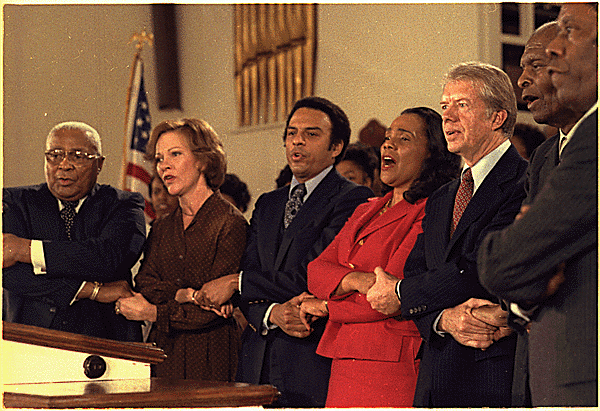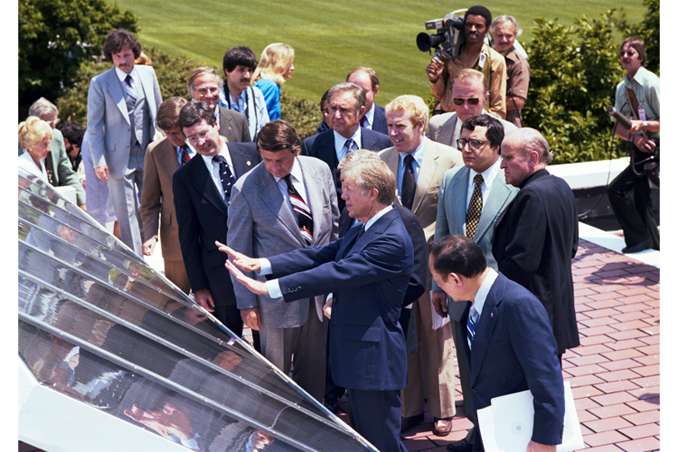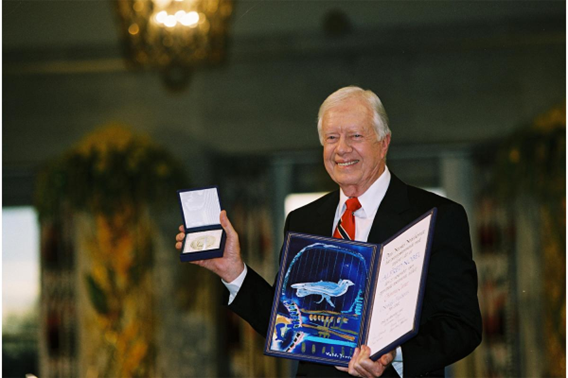Published: December 30, 2024
"President Carter was a man of character, courage, and compassion, whose lifetime of service defined him as one of the most influential statesmen in our history. He embodied the very best of America: A humble servant of God and the people. A heroic champion of global peace and human rights, and an honorable leader whose moral clarity and hopeful vision lifted our Nation and changed our world." President Joseph Biden, December 30, 2024, Message to the Congress on Death of James Earl Carter, Jr.
James Earl “Jimmy” Carter Jr. was the 39th President of the United States (1977-1981) and was awarded the Nobel Peace Prize in 2002.
President Carter died peacefully at his home in Georgia on December 29, 2024. He was the longest-lived U.S. president and the first to have reached 100 years of age. Shortly after his passing, President Joseph Biden released a Proclamation Announcing the Death of James Earl Carter, Jr. On December 30, 2024, President Biden released a Message to the Congress on the Death of James Earl Carter, Jr. and issued an Executive Order Providing for the Closing of Executive Departments and Agencies of the Federal Government on January 9, 2025. The Executive Order states that "All executive departments and agencies of the Federal Government shall be closed on January 9, 2025, as a mark of respect for James Earl Carter, Jr., the thirty-ninth President of the United States."
President Carter had numerous domestic and foreign policy accomplishments. He created the Department of Energy, established a national energy policy to deal with the energy shortage, and decontrolled domestic petroleum prices to stimulate production. He deregulated the trucking and airline industries and prompted Government efficiency through civil service reform. His expansion of the national park system, which included protecting 103 million acres in Alaska, was one of the many ways he sought to improve the environment. By creating the Department of Education, he increased human and social services, bolstered the Social Security system, and appointed record numbers of women, African Americans, and Hispanics to Government jobs.
In foreign affairs, he was a champion for human rights. He helped bring amity between Egypt and Israel through the 1978 Camp David Agreement. He obtained ratification of the Panama Canal treaties and worked to establish full diplomatic relations with the People's Republic of China. He continued difficult negotiations over hostages in Iran, leading to the release of 52 Americans the day he left office.
On December 23, 1987, 101 Stat. 1434 established Georgia's Jimmy Carter National Historic Site and Preservation District, and on August 9, 1999, President William J. Clinton presented the Presidential Medal of Freedom to Former President Jimmy Carter and Rosalynn Carter in Atlanta.
Explore Public Papers of the President of the U.S., Administration of James E. Carter.
Read Tributes to President Carter across collections.
See historical documents associated with President Carter in the Serial Set Collection.
Legislation and Other Key Documents Related to the Carter Administration
- January 21, 1977 – Granting Pardon for Violations of the Selective Service Act, August 4, 1964, to March 28, 1973, (91 Stat. 1719)
- August 4, 1977 – Department of Energy Organization Act (91 Stat. 567)*
- April 10, 1979 – “Taiwan Relations Act,” April 10, 1979, (93 Stat. 14)
- September 18, 1992 – Task Force of Members of the House Committee on Foreign Affairs to Investigate Certain Allegations Concerning the Holding of Americans as Hostages by Iran in 1980 (“October Surprise'')
- September 19, 1994 – The President’s News Conference with President Jimmy Carter, General Colin Powell, and Senator Sam Nunn on Haiti, pp 1574-1578
- March 23, July 1, and 21, 1999 – A Reexamination of U.S. - China Relations, Hearings before the Subcommittee on East Asian and Pacific Affairs of the Committee on Foreign Relations
- October 12, 1999 – Congressional Record, Proceedings and Debates of the 106th Congress, First Session, October 12, 1999 – SALT
- January 2001 – Treaties and Other International Agreements: The Role of the United States Senate April 10, 1979, (Senate Committee Print 106-71)
- April 29, May 18, 19, 25, June 10, 15, 16, 24, and July 15, 2010 – The New Start Treaty Hearings before the Committee on Foreign Relations United States Senate One Hundred Eleventh Congress (Treaty Doc. 111–5)
*This links to a Statute Compilation, which is a compilation of the public law, as amended, and is an unofficial document and should not be cited as legal evidence of the law. Learn more.
Images

Public Papers of the Presidents of the United States: William J. Clinton, September 14, 1993 (Book II)

Public Papers of the Presidents of the United States: William J. Clinton, February 8, 1999 (Book I)

Administration of Barack H. Obama, Public Papers of the Presidents of the U.S.


